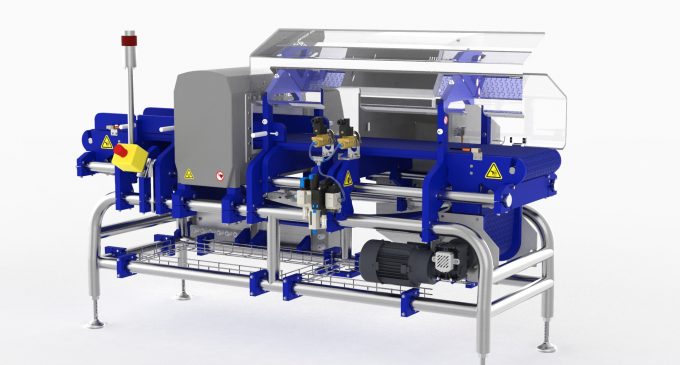Mettler-Toledo’s GC Series Conveyorized Metal Detectors Record Strong Productivity and Uptime Benefits

Since its launch last year, manufacturers across 20 countries worldwide, who have implemented Mettler-Toledo’s GC (Global Conveyor) Series of integrated conveyorized metal detection systems are reporting significant productivity and uptime benefits. The modular design of the GC Series’ integrated system offers manufacturers the flexibility to meet different food safety compliance and production needs. Selecting a complete system solution, i.e. metal detector and conveyor, from a single supplier, will deliver optimal mechanical and electrical integration within a production environment to enhance productivity. Metal detector specific features available on GC Series systems such as Intuitive Clustering and Reduced Test Mode are helping food manufacturers to improve production efficiency and uptime by completing the inspection of more products in less time than previously reported.
“The GC Series metal detection systems are delivering tangible benefits for our customers,” said Mike Bradley, Head of Market Management, Mettler-Toledo Safeline Metal Detection. “Across a range of market sectors and wet and dry applications, the GC Series provides maximised production efficiency and helps to safeguard manufacturers’ businesses and address product demand challenges that COVID-19 has brought this year.”
The GC Series systems boast a modular design to suit manufacturer’s applications, product characteristics and production requirements. Manufacturers initially select a Mettler-Toledo metal detection head, such as the Signature, Signature Touch, Profile/Profile RB or Profile Advantage metal detector. This is then integrated with a customisable and scalable conveying system, including a choice of polyurethane or modular belts. Finally, the modular system is configured with the appropriate material handling system of reject mechanisms needed for the safe removal of non-conforming products and failsafe elements to prove due diligence.
“The unique modular design of the GC Series is key to a future-proof conveyorised system,” said Bradley. “We have created a design that is easily modified to meet the changing requirements for food manufacturers. With production costs increasing, our customers need solutions that help to reduce total cost of ownership and will grow with their business. The modular design also means that service interventions are safer, faster and easier – reducing production downtime.”
The conveyorized metal detectors present a raft of additional operational benefits that address the current production and compliance challenges of manufacturers, as well as featuring a modular design that enables a smooth upgrade path from stop alarm to full due diligence, as and when required. For instance, the Profile Advantage system saves costs and improves productivity through its dynamic “Product Signal Suppression” technology. This removes the product signal variation that is present in most natural, fresh and chilled products, virtually eliminating false rejects. Users can view on-screen product histograms that display the product signal strength of all “good” products inspected, allowing monitoring of trends and better decision-making.
Intuitive Clustering allows products with similar characteristics to be grouped into a single operational setting. This removes the need for frequent operator intervention and changes to product settings, reducing potential for errors, and allowing downtime during a product change to be kept to a minimum. The majority of manufacturers using Intuitive Clustering in wet food segments such as bakery, cheese and meat have reported that they have reduced the time lost to product changeovers by a factor of four. Productivity savings potentially can equate to hundreds of hours per year.
Reduced Test Mode, which is suitable for dry product applications only, allows the metal detector to be run for extended periods without the need for routine performance monitoring tests to be carried out. It does this by maintaining the operation of the system at a higher specification than required and alerting the operator if performance levels change. Within the quarantine period, i.e. the time that the product is on-site after it has been produced and before it leaves the facility, testing frequency can be reduced by as much as 83% using this technology. This translates to a very significant boost to machine uptime and productivity.
Using the Reduced Test Mode has been shown to increase the productivity/Overall Equipment Effectiveness (OEE) of individual lines and entire factories by up to 1%. Instead of running performance monitoring tests every hour, manufacturers can now test their metal detectors less frequently, with no loss in quality assurance. Improved hygiene and reduced risk of error also result from less operator intervention and physical touching of the machine. A free calculator is available for manufacturers to assess how much they can save by optimising metal detection testing based on their individual production processes: www.mt.com/md-roi-rt
The GC Series is designed and built on a single supplier model combining metal detection best practise and food safety expertise. The stable design of the electrically optimised conveyor, for example rollers, belt etc., improves the inspection performance of the metal detector thereby reducing False Reject Rates (FRR). A fully integrated system reliably detects and rejects products containing metal contaminants, i.e. ferrous and non-ferrous metals, plus stainless, and efficiently removes them from production.
More efficient cleaning processes and reduced downtime result from the GC Series’ open frame design, quick removal of components, and rounded tubular frames. Mettler-Toledo’s ProdX data management software automatically collects critical inspection process data, so that test results can be viewed remotely – increasingly important today, when manufacturers must find ways to operate with fewer people on the production floor.




















